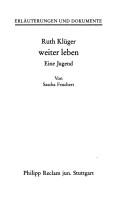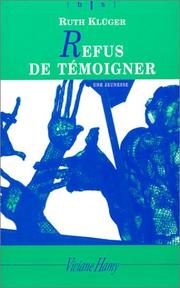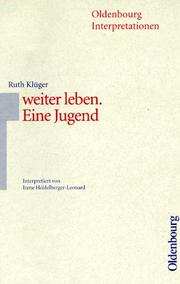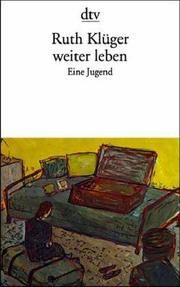| Listing 1 - 10 of 10 |
Sort by
|
Dissertation
Abstract | Keywords | Export | Availability | Bookmark
 Loading...
Loading...Choose an application
- Reference Manager
- EndNote
- RefWorks (Direct export to RefWorks)

ISBN: 3150160456 9783150160459 Year: 2004 Publisher: Stuttgart Reclam
Abstract | Keywords | Export | Availability | Bookmark
 Loading...
Loading...Choose an application
- Reference Manager
- EndNote
- RefWorks (Direct export to RefWorks)
Book
ISBN: 9783110757743 3110757745 Year: 2023 Publisher: Berlin ; Boston : De Gruyter,
Abstract | Keywords | Export | Availability | Bookmark
 Loading...
Loading...Choose an application
- Reference Manager
- EndNote
- RefWorks (Direct export to RefWorks)
Scholarship often presumes that texts written about the Shoah, either by those directly involved in it or those writing its history, must always bear witness to the affective aftermath of the event, the lingering emotional effects of suffering. Drawing on the History of Emotions and on trauma theory, this monograph offers a critical study of the ambivalent attributions and expressions of emotion and “emotionlessness” in the literature and historiography of the Shoah. It addresses three phenomena: the metaphorical discourses by which emotionality and the purported lack thereof are attributed to victims and to perpetrators; the rhetoric of affective self-control and of affective distancing in fiction, testimony and historiography; and the poetics of empathy and the status of emotionality in discourses on the Shoah. Through a close analysis of a broad corpus centred around the work of W. G. Sebald, Dieter Schlesak, Ruth Klüger and Raul Hilberg, the book critically contextualises emotionality and its attributions in the post-war era, when a scepticism of pathos coincided with demands for factual rigidity. Ultimately, it invites the reader to reflect on their own affective stances towards history and its commemoration in the twenty-first century.
Emotions in literature. --- Holocaust, Jewish (1939-1945) in literature. --- Holocaust, Jewish (1939-1945), in literature --- History and criticism. --- Hilberg, Raul, --- Klüger, Ruth, --- Schlesak, Dieter, --- Sebald, W. G. --- Klüger, Ruth, --- Holocauste. --- Émotions. --- Sebald, Winfried Georg,

ISBN: 2878581725 9782878581720 Year: 2003 Publisher: [Paris] : Viviane Hamy,
Abstract | Keywords | Export | Availability | Bookmark
 Loading...
Loading...Choose an application
- Reference Manager
- EndNote
- RefWorks (Direct export to RefWorks)
Jews --- Jewish children in the Holocaust --- Holocaust, Jewish (1939-1945) --- Juifs --- Enfants juifs pendant l'Holocauste --- Holocauste, 1939-1945 --- Biography. --- Biography --- Personal narratives. --- Biographie --- Biographies --- Récits personnels --- Klüger, Ruth,

ISBN: 3486886800 9783486886801 Year: 1996 Volume: 81 Publisher: München Oldenbourg
Abstract | Keywords | Export | Availability | Bookmark
 Loading...
Loading...Choose an application
- Reference Manager
- EndNote
- RefWorks (Direct export to RefWorks)
Holocaust survivors --- Holocaust, Jewish (1939-1945) --- Jews --- World War, 1939-1945 --- Survivants de l'Holocauste --- Holocauste, 1939-1945 --- Juifs --- 2ème guerre mondiale --- Biography --- Personal narratives --- Prisoners and prisons, German --- Biographie --- Récits personnels --- Prisonniers et prisons des Allemands --- Klüger, Ruth, --- 2ème guerre mondiale --- Récits personnels --- Klüger, Ruth,

ISBN: 3423119500 9783423119504 Year: 2010 Publisher: München Deutscher Taschenbuch Verl.
Abstract | Keywords | Export | Availability | Bookmark
 Loading...
Loading...Choose an application
- Reference Manager
- EndNote
- RefWorks (Direct export to RefWorks)
Holocaust survivors --- Holocaust, Jewish (1939-1945) --- World War, 1939-1945 --- Jews --- Survivants de l'Holocauste --- 2ème guerre mondiale --- Juifs --- Biography. --- Prisoners and prisons, German --- Biographie --- Prisonniers et prisons des Allemands --- Klüger, Ruth, --- Holocaust, Jewish (1939-1945) - Personal narratives --- World War, 1939-1945 - Prisoners and prisons, German --- Jews - Austria - Vienna - Biography --- Holocaust survivors - Austria - Vienna - Biography
Book
ISBN: 128237253X 9786612372537 3484970995 9783484970991 3484651733 9783484651739 9783484651739 Year: 2009 Publisher: Tübingen M. Niemeyer
Abstract | Keywords | Export | Availability | Bookmark
 Loading...
Loading...Choose an application
- Reference Manager
- EndNote
- RefWorks (Direct export to RefWorks)
Der Band untersucht die autobiographischen Projekte von Saul Friedländer und Ruth Klüger im Kontext ihres wissenschaftlichen Werkes. Sowohl Friedländer als auch Klüger betonen in ihren theoretischen Essays, dass die Interpretationen wissenschaftlicher Dokumente niemals losgelöst vom kulturellen und historischen Kontext und dem persönlichen Hintergrund des Interpreten entstehen. Eine definitive, allgemeingültige Deutung historischer und literarischer Dokumente existiert folglich nicht. Dies gilt ebenso und in besonderem Maße für die Annäherung an die persönliche Vergangenheit -kann diese doch immer nur über den Akt autobiographischen Erinnerns (re)konstruiert werden. Trotz ihrer Betonung der Kontextabhängigkeit von Interpretationen, die eine Vielzahl möglicher Deutungen impliziert, gehen jedoch weder Friedländer noch Klüger so weit, den referentiellen Charakter von Sprache in Frage zu stellen und die Grenze zwischen Fakten und Fiktion aufzulösen. Sowohl ihr autobiographisches als auch ihr wissenschaftliches Werk stehen vielmehr im Spannungsfeld zwischen dem Bewusstsein für die Vorläufigkeit und Subjektivität jeder Interpretation einerseits - und dem Anliegen andererseits, auf eine außerhalb des Textes bestehende Realität zu verweisen. Damit nähern sich Friedländer und Klüger von den Polen ihrer traditionell entgegengesetzten wissenschaftlichen Disziplinen an: der an ,objektiven', nachprüfbaren Fakten orientierten Geschichtswissenschaft - und der Literaturwissenschaft, in deren Mittelpunkt die Auseinandersetzung mit Fiktion steht.
Holocaust, Jewish (1939-1945) --- Jewish authors --- Autobiography --- Autobiography of Jews --- Jewish autobiography --- Authors --- Historiography. --- History and criticism. --- Jewish authors. --- Friedländer, Saul, --- Klüger, Ruth, --- Angress, R. K. --- פרידלנדר, שאול --- Criticism and interpretation. --- Friedländer, Saul --- Autobiography / in Literature. --- History of Literature. --- Jews / Literature. --- Friedlander, Saul, --- Kluger, Ruth,
Book
ISBN: 1571138765 1571135782 Year: 2013 Publisher: Suffolk : Boydell & Brewer,
Abstract | Keywords | Export | Availability | Bookmark
 Loading...
Loading...Choose an application
- Reference Manager
- EndNote
- RefWorks (Direct export to RefWorks)
Demographers say that by the year 2060, every seventh person in Germany will be aged eighty or older, and every third person over sixty-five. The prediction for other Western countries is scarcely different. Indeed, the aging society is seen by some as a graver threat than even global warming, with potentially unmanageable tensions relating to intergenerational relationships, work and benefits, and flows of people. This book explores the representation and performance of aging in recent "late-style" German-language fiction. It situates the authors chosen as case studies -- Günter Grass, Ruth Klüger, Christa Wolf, and Martin Walser -- in their biographical and social contexts and explores the significance of their aesthetic figuring of aging for debates raging both in Germany and internationally. In particular, the book looks at gender, generations, and trauma and their impact on how writers "narrativize" aging. Finally, it examines the "timeliness" of these different representations and late-style performances of aging in the context of the shift of social, political, and economic power away from the declining societies of the West to the ascendant societies of the East. Stuart Taberner is Professor of Contemporary German Literature, Culture, and Society at the University of Leeds.
German literature --- Old age in literature. --- Aging in literature. --- Older people in literature --- History and criticism. --- Grass, Günter, --- Klüger, Ruth, --- Wolf, Christa --- Walser, Martin, --- Volf, Krista --- Ihlenfeld, Christa Margarete --- Angress, R. K. --- Criticism and interpretation. --- Grass, Günter --- Грасс, Гюнтер --- גראס, גינטר, --- Ґрас, Ґюнтер --- Gras, Gi︠u︡nter --- Girās, Gūntir --- Grās, Gūntir --- گونتر، گراس, --- Aging. --- Christa Wolf. --- Germany. --- Günter Grass. --- Intergenerational Relationships. --- Late Period. --- Martin Walser. --- Old-Age Style. --- Ruth Klüger. --- Social, Political, Economic Power. --- Trauma. --- Western Countries.
Book
ISBN: 3839459400 Year: 2022 Publisher: Bielefeld transcript Verlag
Abstract | Keywords | Export | Availability | Bookmark
 Loading...
Loading...Choose an application
- Reference Manager
- EndNote
- RefWorks (Direct export to RefWorks)
Die Literatur von Überlebenden der Shoah zeichnet sich oft durch einen kühlen, sachlichen Ton und eine luzide Nüchternheit aus. Welche Bedeutung kommt diesen Stilmerkmalen in der literarischen Auseinandersetzung der Autorinnen und Autoren mit den eigenen Erlebnissen zu? Wie lassen sich die erzählerischen und essayistischen Strategien zusammenführen? Bianca Patricia Pick legt in ihrer Untersuchung der autobiographischen und fiktionalen Texte der jüdischen Verfolgten Albert Drach, Jean Améry, Edgar Hilsenrath, Imre Kertész und Ruth Klüger ein Hauptaugenmerk auf die Deutungskategorie der Distanz als Schreibverfahren, das Züge des Sarkastischen, Grotesken, des Ressentiments und des Protokolls annimmt.
Shoah; Überlebende; Antisemitismus; Holocaust; Autobiographie; Stilmittel; Jean Améry; Albert Drach; Edgar Hilsenrath; Imre Kertész; Ruth Klüger; Sarkasmus; Ressentiment; Protokollstil; Holocaustliteratur; Literatur; Mensch; Gesellschaft; Literaturtheorie; Allgemeine Literaturwissenschaft; Kulturgeschichte; Literaturwissenschaft; Survivors; Antisemitism; Autobiography; Style; Sarcasm; Protocol Style; Holocaust Literature; Literature; Human; Society; Theory of Literature; Literary Studies; Cultural History --- Albert Drach. --- Antisemitism. --- Autobiography. --- Cultural History. --- Edgar Hilsenrath. --- Holocaust Literature. --- Holocaust. --- Human. --- Imre Kertész. --- Jean Améry. --- Literary Studies. --- Literature. --- Protocol Style. --- Ressentiment. --- Ruth Klüger. --- Sarcasm. --- Society. --- Style. --- Survivors. --- Theory of Literature. --- Améry, Jean --- Drach, Albert, --- Hilsenrath, Edgar --- Kertész, Imre, --- Klüger, Ruth, --- Améry, Jean. --- Hilsenrath, Edgar. --- Criticism and interpretation.
Book
ISBN: 1283366320 9786613366320 9401207062 9789401207065 9789042034211 9042034211 9781283366328 6613366323 Year: 2011 Publisher: Amsterdam Editions Rodopi
Abstract | Keywords | Export | Availability | Bookmark
 Loading...
Loading...Choose an application
- Reference Manager
- EndNote
- RefWorks (Direct export to RefWorks)
In this book, Camila Loew analyzes four women’s testimonial literary writings on the Holocaust to examine and question some of the tenets of the fields of Holocaust studies, gender studies, and testimony. Through a close reading of the works of Charlotte Delbo, Margarete Buber-Neumann, Ruth Klüger, and Marguerite Duras, Loew foregrounds these authors’ search for a written form to engage with their experiences of the extreme. Although each chapter contains its individual focus and features, the book possesses a unity in intention, concerns, and consequences. In the theoretical introduction that unites the four chapters, Loew eschews essentialism and revises the emergence of the field of Women and Holocaust studies from the early 1980's on, and signals some of its shortcomings. In response, and in accordance with a recent turn in various disciplines of the Humanities, Loew highlights the ethical dimension of testimony and its responsible commitment to the other. In dealing with the texts as literary testimonies—a complex genre, between literature and history—, testimony is freed from the obligation to respond to the requirements of factual truth, and becomes a privileged form to voice the traumatic event, and to symbolically explore the role of excess.
Holocaust survivors. --- Holocaust, Jewish (1939-1945), in literature. --- Women authors --- Holocaust, Jewish (1939-1945) in literature. --- Women authors. --- Authors, Women --- Female authors --- Women as authors --- Authors --- Women and literature --- Survivors, Holocaust --- Victims --- Delbo, Charlotte. --- Klüger, Ruth, --- Duras, Marguerite. --- Buber-Neumann, Margarete, --- Angress, R. K. --- Di͡uras, Marherit --- Doras, Margerête --- Doras, Margrête --- Du, Lasi --- Dulasi, Magolite --- Dûras, Margrît --- Dwirasŭ, Marŭgŭritt --- Tu, La-ssu --- Tu-la-ssu, Ma-ko-li-tʻe --- Twirasŭ, Marŭgŭritt --- Buber, Margarete, --- Buber-Neĭman, Margarete, --- Faust, Anna Margarete, --- Faust, Margarete Anna, --- Neumann, Margarete Buber-, --- Duras, Marguerite --- デュラス, マルグリット --- デュラス, M. --- Dwirasŭ, Marŭgŭrittŭ --- Twirasŭ, Marŭgŭrittŭ --- Di︠u︡ras, Marherit --- Дюрас, Маргерит --- דיראס, מרגריט --- Donnadieu, Marguerite, --- 1900 - 1999 --- Duras, Marguerite, --- Holocaust, Jewish (1939-1945) --- Prison psychology --- Psychological aspects. --- דלבו, שרלוט
| Listing 1 - 10 of 10 |
Sort by
|

 Search
Search Feedback
Feedback About UniCat
About UniCat  Help
Help News
News